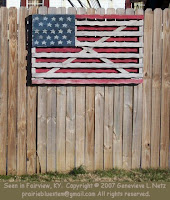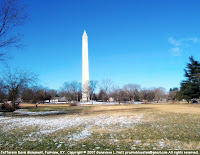Life in Christian County, Kentucky... Life in The Upper South... History and Old Stuff...
I suppose every town in the world seeks a claim to fame -- a famous person or event that has some connection to that place. In Bassett, Nebraska, the nearest town to the place where I grew up, the best they could do was a horse thief, Kid Wade, who was hung by vigilantes on a big hill at the edge of town.
The village of Fairview, Kentucky, can claim a truly famous American in its history. The President of the Confederate States of America (CSA), Jefferson Davis, was born there.
Note: For my readers outside the USA, let me briefly explain that the United States had a civil war from 1860 to 1865, in which the South formed the CSA and attempted to leave the Union, but the North refused to let them go. The great underlying issue and primary cause of the Civil War was slavery and it was abolished after the war, but many people in the South felt they were fighting for states' rights (that is, their state's right to secede from the Union.)
Kentucky was a border state during the Civil War. Though the CSA claimed Kentucky and gave it a star on their flag, Kentucky did not secede from the Union. Some Kentuckians fought for the CSA, but others fought for the USA. That being said, it is certainly true that Christian County had many slaveowners who raised tobacco and other crops with slave labor, and many soldiers from here probably fought for the CSA.
After the war ended and slavery was abolished, a new era began in the South. The thorough defeat left a spirit of defiant resentment that was nurtured and cherished in some hearts. Reconstruction abuses created more ill feelings. Out of the worst, soul-consuming, twisted hatred, the Ku Klux Klan was born.
The Daughters of the Confederacy expressed themselves in non-violent, public ways. They honored the service and sacrifice of their fathers by building many monuments to Confederate soldiers across the South. The monument they built to Jefferson Davis at Fairview, Kentucky, was the largest of these. There's plenty of defiance expressed in it, I think, but in a less malignant way.
 I don't really know what other people in Christian County think about Jefferson Davis, but his monument is certainly an element in the landscape here. It can be seen for miles around, towering above the fields, houses and trees.
I don't really know what other people in Christian County think about Jefferson Davis, but his monument is certainly an element in the landscape here. It can be seen for miles around, towering above the fields, houses and trees.As for me, I am thankful that I was born in the (Mid)West, not in a state from the Civil War's North or South. My birth state, Nebraska, joined the Union in 1865, the year that the Civil War ended. Some of my ancestors on both sides of the family hadn't even come over from Europe yet, and others were living west of most of the action. If there are any family stories about the Civil War, I don't know them.
Since we live just five miles from the Jefferson Davis park in Fairview, we took the kids there frequently to play on the swings and slides when they were little. The monument and the visitor's center are conveniently-located historic curiosities to show any non-local visitors we have. This is the meaning of the monument to me.

Related posts:
Jefferson Davis Monument, Fairview, KY
Seen at Fairview, Kentucky .
Technorati tags:

2 comments:
I was born in the Northern Virginia suburbs of Washington, DC of a father from Gordon, NE - not far from your hometown and of a mother from central Florida. So that makes me a nominal Southerner.
I have struggled with the meaning of the Civil War. In grade school it was "cool" to be a "Rebel" as opposed to a "Yankee." But as I grew I came to understand the deeper significance of these terms and for what what they actually stood.
I've come to the conclusion that the Civil War, like most of humanity's manmade catastrophes, was largely fought by poor people for the benefit of rich people.
Most southerners in those days didn't own slaves, but the economy of the time depended on them. Rich landowners extracted enormous profits from free labor. Poor ignorant farmers were induced into sacrificing their lives and families to benefit these rich landowners. Thomas Jefferson recognized that the institution of slavery was morally unsustainable, and he was right.
Sounds a bit familiar... today America is realizing that we were dragged into yet another unecessary war through manipulation of public opinion by a few who stood to make enormous profits from Iraq's oil.
50,000 of my generation sacrificed their lives in Vietnam, and countless more lives were ruined for what we now understand was no good reason.
The rich and powerful once more manipulate the poor and ignorant.
When will we ever learn?
Sorry for the rant, but thanks for the insight.
You know, I am really surprised how many people think that Kentucky was a full-fledged member of the Confederacy. That wasn't at all true. When I went to Fort Donelson, TN, for example, the park ranger there told me that ancestors on both sides of her family all fought for the Union and they were from the area of Kentucky now occupied by Land Between the Lake. I imagine that there were plenty of grudges amongst neighbors after the War, as well as grudges against the "Yankee aggression."
Post a Comment